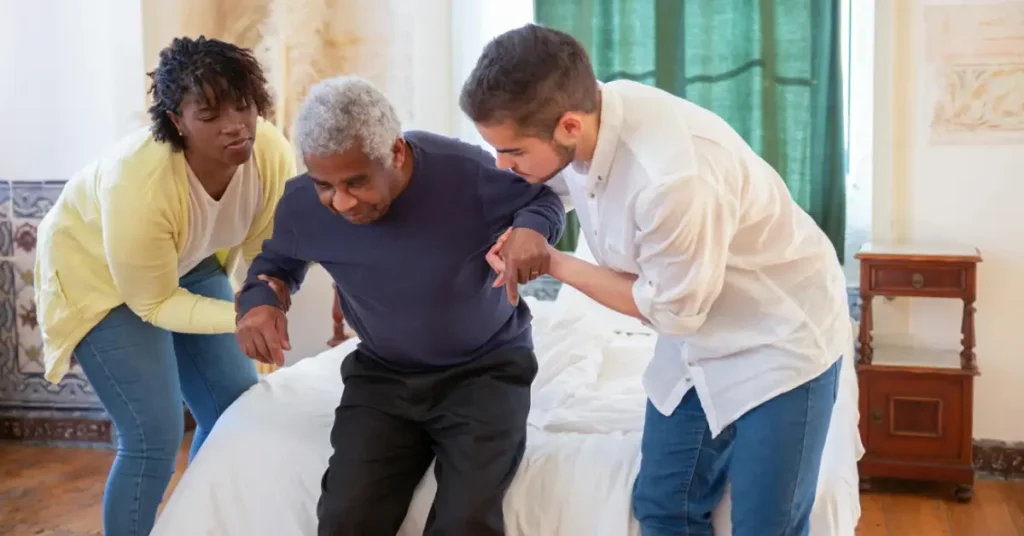Recovering after a hospital stay can be difficult for seniors. Many face weakness, confusion, or complications once they return home. Even small lapses in care can delay recovery or lead to readmission.
The rising demand for elderly support reflects this growing need. In 2024, the global elderly care market was worth about $49 billion. The market would nearly double in valuation by 2032, growing at around 9% each year. North America leads the market, holding over one-third of the total share.
With home care, seniors can heal comfortably in familiar surroundings while regaining strength and confidence. Such care helps lower hospital visits and enhances overall well-being. It gives families peace of mind, knowing their loved ones are cared for with patience and empathy.
This article discusses how home care helps older adults recover and adjust after leaving the hospital.
Understanding Post-Discharge Challenges for Seniors
After discharge, many seniors face difficulties managing medication schedules, wound care, or dietary restrictions. Without proper supervision, minor issues can quickly escalate into serious complications. Home care professionals bridge this gap by ensuring medical instructions are followed correctly and consistently through personalized senior care programs.
AmeriBest Home Care notes that emotional health also suffers after hospitalization. Seniors often feel anxious or isolated, especially when family members are unavailable. Mobility and safety are other critical concerns. Falls or physical strain can delay recovery or cause re-hospitalization. Trained caregivers offering senior care support help seniors move safely while providing reassurance that restores emotional balance.
Many also struggle to fully understand or remember their post-discharge instructions, which can affect recovery outcomes. A study in the National Library of Medicine found that older adults often experience communication gaps after hospital discharge.
Many face confusion about medication instructions or follow-up care, which can delay recovery. Personalized senior care services help bridge these gaps by ensuring clear communication, supporting faster recovery.
How Home Care Services Enhance Recovery
Home care is essential for older adults recovering after a hospital stay, helping them rebuild independence and self-assurance. It addresses their medical, physical, and emotional needs while allowing them to heal comfortably at home.
These services provide structured care plans designed around individual requirements. Trained caregivers assist with medication management, therapy exercises, and daily routines, minimizing risks of relapse or complications. This personalized attention allows seniors to heal at their own pace while maintaining dignity and autonomy.
The importance of home healthcare continues to grow as aging populations seek safer and more comfortable recovery options. An increasing number of families now understand that professional home care offers greater long-term advantages than prolonged hospital stays. This shift reflects a greater preference for flexible, compassionate, and cost-effective care within familiar surroundings.
An extensive review published in MDPI examined evidence from multiple studies covering over 3 million participants. The analysis found that integrated home healthcare programs significantly improved seniors’ functional abilities, lowered hospital readmissions, and increased satisfaction with care. The study underscores how structured home care leads to faster healing and sustained independence in older adults.
Emotional and Social Benefits
Hospital stays can often leave seniors feeling anxious, lonely, and emotionally fragile. The shift from a clinical setting back to a familiar home environment can bring immense comfort and reassurance. Having compassionate support at home helps them regain confidence and a sense of emotional stability.
Professional caregivers play an essential role in uplifting seniors’ spirits. Through friendly conversations, shared meals, and engaging hobbies, they create positive interactions that restore joy and motivation. Such emotional engagement not only reduces loneliness but also strengthens mental resilience during recovery.
Home care also enables families to stay closely connected throughout the healing process. This emotional closeness builds trust and encourages optimism in recovery. Home-based emotional and social support helps seniors heal more holistically. It creates a nurturing atmosphere where comfort, companionship, and human connection become powerful tools for long-term well-being.
Promoting Long-Term Wellness
Long-term wellness for seniors depends on consistent monitoring, preventive care, and healthy daily routines. Home care services support these goals by creating personalized plans that promote mobility, nutrition, and emotional balance. This continuous care helps seniors maintain stability long after their initial recovery.
Professional caregivers encourage seniors to adopt lifestyle habits that prevent relapse and strengthen physical endurance. They guide them through light exercises, balanced diets, and medication schedules. These structured habits promote long-term well-being while reducing dependence on frequent medical visits.
Many seniors today are increasingly open to using digital tools that make daily health management easier and more reliable. However, many individuals require the right support to learn how to use these technologies efficiently. Home care professionals assist by setting up, explaining, and managing these devices, ensuring seniors use them confidently and safely.
A recent EY study revealed that adults aged 50 to 59 show a higher interest in hospital-at-home programs, AI tools, and digital healthcare solutions. This trend demonstrates a growing openness to technology-driven care models. Home care plays a vital role in complementing this shift by combining human empathy with technological convenience.
FAQs
1. Can home care services be customized to fit individual senior needs?
Absolutely, home care options are very adaptable and can be customized according to a senior’s health, comfort, and daily routine. After evaluating individual requirements, a personalized care plan is designed to provide the right mix of medical help, personal assistance, and emotional support at home.
2. How can families determine if home care is the right option after discharge?
Families should assess the senior’s medical condition, mobility, and emotional needs. If ongoing supervision, medication reminders, or daily support are necessary, home care is often the best solution. Speaking with a medical professional can guide you in choosing a care plan that aligns with specific recovery needs and goals.
3. Do insurance plans or government schemes provide coverage for home care services?
Coverage depends on location, service type, and insurance policies. Some medical or extended care insurance plans might pay for part of the costs associated with home care services. Certain government programs may also offer support for seniors with medical needs after hospital discharge. Always verify eligibility before starting services.
Home care services play a vital role in helping seniors recover smoothly after hospitalization. They combine medical supervision, emotional encouragement, and everyday assistance to ensure complete well-being.
Families find comfort in knowing their loved ones are receiving care in the safety and comfort of their own home. With compassionate and consistent support, seniors can regain strength, rebuild confidence, and enjoy a comfortable and dignified life at home.




… [Trackback]
[…] Info on that Topic: businessworldclass.com/the-role-of-home-care-in-supporting-seniors-after-hospital-discharge/ […]